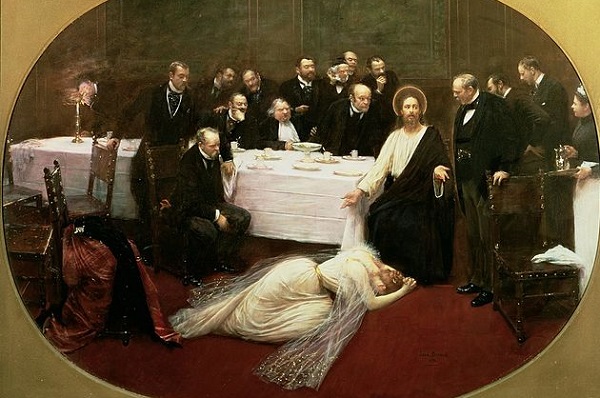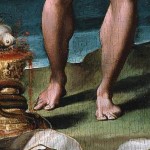
My wanderings you have noted; are my tears not stored in your flask, recorded in your book? My foes turn back when I call on you. This I know: God is on my side. –Psalm 56
The app Laudate Liturgy of the Hours app is a boon to my engagement with what the 20th century’s greatest Protestant theologian, Karl Barth, called the strange world of the Bible. It is the chief reason why I’ve taken a more bible-centered approach recently with posts such as Did God Rape the Prophet Jeremiah?, Jesus Didn’t Call God Daddy, and Ever Wonder Why Saint Paul Went to Arabia?. The Liturgy of the Hours daily brings me face-to-face with passages such as the one above.
What could a tear flask mean? Is it a mere metaphor? Or is it something that was rooted in everyday life? After consulting Barbara M. Bowen’s Strange Scriptures That Perplex the Western Mind I know for certain it’s the latter.
Bowen, who was associated with the fundamentalist Moody Bible College, had a wonderfully extra-biblical method for deciphering the Bible:
Palestine has changed very little since Bible days, the people are chiefly Ishmaelites and dress, eat, live and think as their ancestors did. They live this very primitive life because their parents and grandparents for a hundred generations have lived so.
They say, “Our father Abraham lived as we do, what was good for him is good for us; what was good enough for yesterday is good enough for tomorrow.”
A better understanding of their lives, their homes, their dress, their work and their ways of thinking will help us to comprehend many Scriptures that now appear strange.

This is one selfish reason why the preservation of not only the disappearing religions of the Middle East should be important to First World Christians. Without their testimony it would be impossible to understanding what flasks and tears really mean in the Psalm above.
Bowen’s Strange Scriptures helps us understand the Psalm in her commentary on the passage from Luke (7:38) about the woman, usually associated with Mary Magdalene, who washes Christ’s feet with her tears and then dries them with her hair:
We find reference in many old books to the custom of collecting the tears of the whole family and preserving them in bottles. Thus King David prays, “Put thou my tears into thy bottle: are they not in thy book?”
Tear bottles have been found in very large numbers on opening ancient tombs. They are made of thin glass usually, although the very poor sometimes had just simple pottery bottles, not even baked or glazed. They were all made with a slender body, broad at the base, with a funnel-shaped top. Every member of the family owned a tear bottle and they collected the tears of the whole family.
What purpose did these repositories serve?
When serious trouble or a death occurred in the home, all the relatives came and each one brought his tear bottle with him. As they wept and wailed, the tears rolling down their cheeks, each person took his or her tear bottle and gathered tears from the faces of all present. This bottle was exceedingly sacred to them. It represented all the heartaches, sorrows and bereavements from the grandparents down to the small child. When a person died, his tear bottle was buried with him, as one of his most sacred possessions.
This helps us to a better understanding of what the woman did for her Master. She noticed the very discourteous way in which Christ was treated as a guest in the house of Simon the Pharisee. He provided no water to wash the
Lord’s feet and no oil to anoint his head; so this poor, sinful woman, longing for forgiveness and a new life, took her tear bottle, poured the tears over his tired, dusty feet and wiped them with her long hair. A great sacrifice indeed, done in love and gratitude to the Saviour. They could not be replaced and she might die without a bottle of tears to be buried with her in her tomb.
How strange and beautiful is this? Could we use more peace in the Middle East? There’s nothing strange about this little Bible meeting turning towards geopolitics, because the separation between Church and state is a convenient fiction never practiced in reality.
For more explanations of Strange Scriptures That Perplex the Western Mind see: Did God Rape the Prophet Jeremiah?, Jesus Didn’t Call God Daddy, and Ever Wonder Why Saint Paul Went to Arabia?.
Please consider making a donation to this blog through the donation button on the upper right side of its homepage.
Stay in touch! Like Cosmos the in Lost on Facebook:












